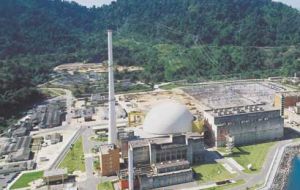MercoPress. South Atlantic News Agency
Brazil resumes construction of nuclear power plant
 Nuclear Plant in Angra dos Reis
Nuclear Plant in Angra dos Reis Following on Brazil's National Energy Policy Council recommendations the President Lula da Silva administration has given the green light for the resumption of construction of the third reactor at the Angra nuclear power plant, reports Sao Paulo's Gazeta Mercantil.
Officials said approval of Angra 3 means the start of a wider nuclear project to construct up to eight reactors by 2030. Angra 3 was originally planned as a twin unit to Angra 2, a 1270 MW pressurized water reactor (PWR) which started up in 2000. Construction of the third unit began in 1984. Parts for the reactor had been purchased before the project was later frozen due to a lack of funds, and over 70% of the equipment is already on site. It is estimated that the project will cost 4.1 billion US dollars to complete according to Brazil's Eletronuclear. The four years delay has been attributed to doubts from different ministers of the Lula da Silva administration as to the efficiency of the nuclear program, particularly cabinet chief and former Energy minister Dilma Rousseff and energy minister Nelson Hubner. However it seems that under the new minister Edison Lobao all doubts about the project were overcome. Angra 1 and Angra 2 have a generating capacity of 2.300 MW and currently represent 2% of the Brazilian electricity supply. By 2015 when Angra 3 should be generating nuclear energy will represent 2.5% of the country's total supply taking into consideration other sources and expansion of the existing. Electricity consumption in Brazil has grown strongly since 1990. Per capita consumption is 2.235 kWh/yr. Nuclear energy provides about 13 billion kWh per year. About 40% of Brazil's electricity is produced by the national Eletrobras system. About 30% of electricity is from state-owned utilities, and 20% from the 12.6 GW Itaipu hydro scheme on the Paraguayan border. About 9% is from auto-producers and private generators. Nuclear energy in Brazil dates back to 1970 when the government decided to seek bids for an initial plant. The turnkey contract for Angra-1 was awarded to Westinghouse, and construction started in 1971 at a coastal site between Rio de Janeiro and Sao Paulo. In 1975 the government adopted a policy becoming fully self-sufficient in nuclear technology and signed an agreement with West Germany for supply of eight 1300 MW nuclear units over 15 years. The first two were to be built immediately, with equipment from Siemens-KWU. The rest were to have 90% Brazilian content under the technology transfer agreement. To this effect a state-owned company Empresas Nucleares Brasileiras (Nuclebras) was set up with a number of subsidiaries focused on particular aspects of engineering and the nuclear fuel cycle. However, Brazil's economic problems meant that construction of the first two Brazilian-German reactors was interrupted, and the whole program was reorganized at the end of the 1980s. In 1988 a new company, Industrias Nucleares Brasileiras SA (INB) replaced Nuclebras and most of its subsidiaries, but with limited authority and function related to fuel cycle activities. INB is a subsidiary of the National Nuclear Energy Commission (CNEN). Responsibility for construction of Angra 2 & 3 was transferred to the utility Furnas, a subsidiary of Eletrobras. Construction of Angra-2 resumed in 1995, with 1.3 billion US dollars of new investment provided by German banks, Furnas and Eletrobras. Then in 1997 a new company Eletronuclear was set up as a subsidiary of Eletrobras and made responsible for all construction and operation of nuclear power plants. It combined the nuclear side of Furnas with the engineering company Nuclen, and Siemens then relinquished its 25% share in it. Nuclep is the continuing subsidiary from the Nuclebras period, handling heavy equipment manufacturing and now a subsidiary of CNEN, with INB.




Top Comments
Disclaimer & comment rulesCommenting for this story is now closed.
If you have a Facebook account, become a fan and comment on our Facebook Page!